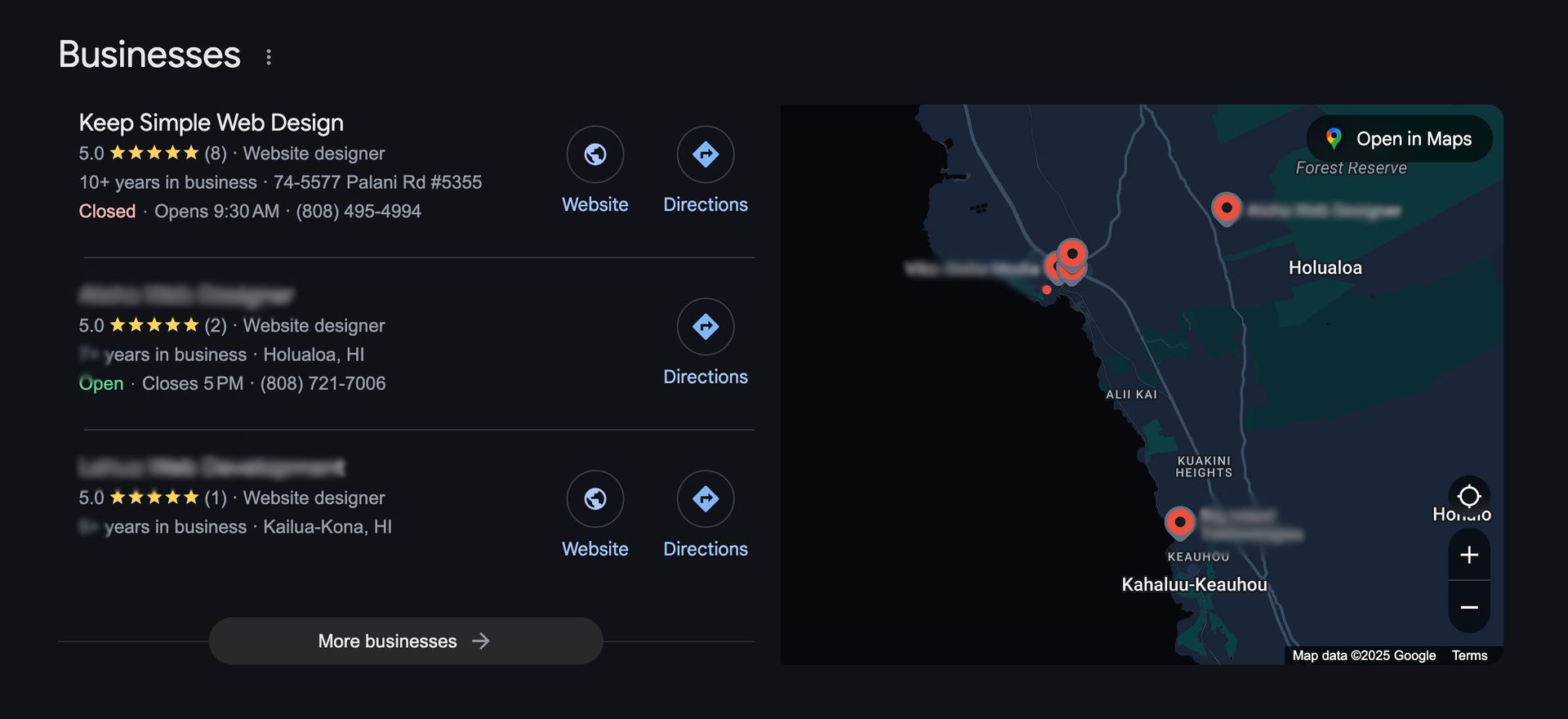Contact Us
Are you in need of assistance with your current website? Please read this first.
Schedule an Appointment
Live Chat
Text Us
(808) 495-4994
In today's digital landscape, having a well-structured website is crucial for any business. However, it's equally important to have the right policies in place to protect both your business and your users. This post will guide you through the essential website policies you should consider implementing.

ADA Compliance
The Americans with Disabilities Act (ADA) requires websites to be accessible to people with disabilities. The Department of Justice (DOJ) considers any business open to the public to fall under ADA requirements. Unlike physical spaces, website accessibility requirements apply to all websites that serve or sell to the public, regardless of the business's size.
While the DOJ has only provided specific rules for State and Local Government websites, it's critical to understand that private businesses are still being sued and often losing in court over website accessibility issues. Courts are consistently ruling that websites need to be accessible, even in the absence of specific DOJ regulations for private businesses. This legal trend makes it imperative for all businesses to prioritize web accessibility.
Ensuring ADA compliance means making your site perceivable, operable, understandable, and robust for all users, including those with visual, auditory, motor, or cognitive impairments. Key aspects include:
- Providing text alternatives for non-text content
- Ensuring easy navigation and operability
- Making content readable and understandable
- Maintaining compatibility with assistive technologies
ADA compliance not only helps avoid potential legal issues but also improves user experience for all visitors. For more detailed information and to stay updated on the latest guidelines, visit the ADA Gov Website Guidance.
Privacy Policy
A Privacy Policy is crucial for modern websites, which are often built to provide a great user experience and motivate prospective customers to inquire about products or services. This is typically achieved through various tools and features that collect personal information.
For instance:
- Contact forms often ask users to submit their name and email address.
- Website analytics tools collect visitor IP addresses and share this data with third-party providers.
- Many other features on websites collect and share personally identifiable information in various ways.
While a Privacy Policy isn't universally required by law, it's often necessary depending on your jurisdiction and data collection practices. Many privacy regulations mandate specific disclosures about how you collect, use, and protect user data. Failure to comply can result in significant penalties.
Moreover, Privacy Policies are required to use many popular third-party tools. For example, Google mandates a Privacy Policy for websites using Google Analytics. This requirement can be found in Section 7 of Google's Terms of Service .
Beyond legal and contractual requirements, a well-crafted Privacy Policy builds trust with your users by demonstrating transparency in your data handling practices. It shows that you respect user privacy and take data protection seriously.
Given the constant evolution of privacy laws and the changing landscape of digital tools, it's important to regularly review and update your Privacy Policy. This ensures ongoing compliance and maintains transparency with your users about how their data is handled.
Cookie Policy and Consent Banner
Cookie consent banners have become a crucial feature of modern websites, serving as a key tool for compliance with various privacy laws. While they may seem inconvenient to users, these banners play a vital role in respecting privacy rights and avoiding potentially severe legal consequences.
The landscape of cookie consent is complex, particularly in California where two laws - the California Privacy Rights Act (CPRA) and the California Invasion of Privacy Act (CIPA) - have conflicting requirements:
- CIPA requires an opt-in approach. Websites must obtain explicit consent before tracking users with cookies, web beacons, pixels, or similar technologies. This applies to any website tracking California residents, regardless of the business's size or location.
- CPRA, on the other hand, allows for an opt-out approach. It permits tracking by default but requires businesses to provide users with the option to opt out of data sharing for targeted advertising, selling of personal information, and use of sensitive personal information.
This conflict creates a challenging situation for businesses, as complying with one law could potentially violate the other. The stakes are high: CPRA violations can result in fines of $2,500 to $7,500 per incident, while CIPA allows for direct consumer lawsuits with penalties of $5,000 per violation.
Given this complex legal environment, a comprehensive Cookie Policy and consent banner should:
- Block all third-party tracking scripts until user consent is obtained
- Provide clear 'accept' and 'decline' options with equal prominence
- Ensure no tracking occurs if a user declines consent
- Allow users to withdraw previously given consent
- Offer detailed information about tracking technologies used
- Comply with both opt-in (CIPA) and opt-out (CPRA) requirements where applicable
It's crucial to note that cookie laws are evolving rapidly, and requirements can vary significantly between jurisdictions. Regular review and updates to your Cookie Policy and consent practices are essential to maintain compliance and protect your business from potential legal issues.
Terms of Service Agreement
This agreement sets the rules for using your website and can help limit your liability.
It should cover:
- Third-party links disclaimer
- DMCA notice for copyright issues
- User responsibilities and prohibited activities
A well-crafted Terms of Service can significantly reduce the risk of website-related lawsuits.
Disclaimer
A Disclaimer is a vital document that helps limit your responsibilities and liabilities in specific circumstances related to your website content and services.
It's particularly important to include a Disclaimer if your website:
- Advertises third-party products or services: A Disclaimer can protect you if users encounter issues with these external offerings.
- Sells or displays health products: This helps protect you if products don't work as expected or if users experience unexpected effects.
- Participates in affiliate programs: Many affiliate programs require a Disclaimer, and it helps maintain transparency with your users.
- Provides health and fitness advice: A Disclaimer can protect you from liability if users experience injuries or health issues after following your advice.
- Offers information that could be interpreted as legal advice: A Disclaimer should clearly state that there is no attorney-client relationship and that the information provided does not constitute legal advice. This protects you from potential legal complications.
A well-crafted Disclaimer should clearly communicate the limits of your responsibilities and the nature of the information or services you provide. It should be written in clear, understandable language and easily accessible on your website.
Remember, while a Disclaimer can offer significant protection, it doesn't provide absolute immunity from all potential legal issues. It's always best to combine a strong Disclaimer with responsible content practices and, when necessary, professional advice.
Protecting Your Business Online: Our Comprehensive Solution
As a web agency, we understand that navigating the complex landscape of online legal requirements can be overwhelming for businesses. That's why we've partnered with leading providers to offer comprehensive digital privacy and compliance services as part of our website packages.
Our service covers all the essential policies we've discussed:
- ADA Compliance
- Privacy Policy
- Cookie Policy and Consent Banner
- Terms of Service
- Disclaimer
By including these crucial elements in our website packages, we ensure that your online presence is not only visually appealing and functional but also legally protected. Our partner services automatically stay up-to-date with the latest legal requirements and best practices, so you don't have to worry about keeping track of changing regulations.
These services generate policies tailored to your specific business needs, ensuring comprehensive protection while building trust with your users. Our goal is to provide you with peace of mind, knowing that your website is equipped with the necessary legal safeguards.
Remember, while this post provides a general overview, it's always best to consult with a legal professional to ensure your website policies are comprehensive and compliant with all applicable laws.
Ready to protect your online presence?
Contact us today to learn how we can incorporate these essential legal safeguards into your website package.




